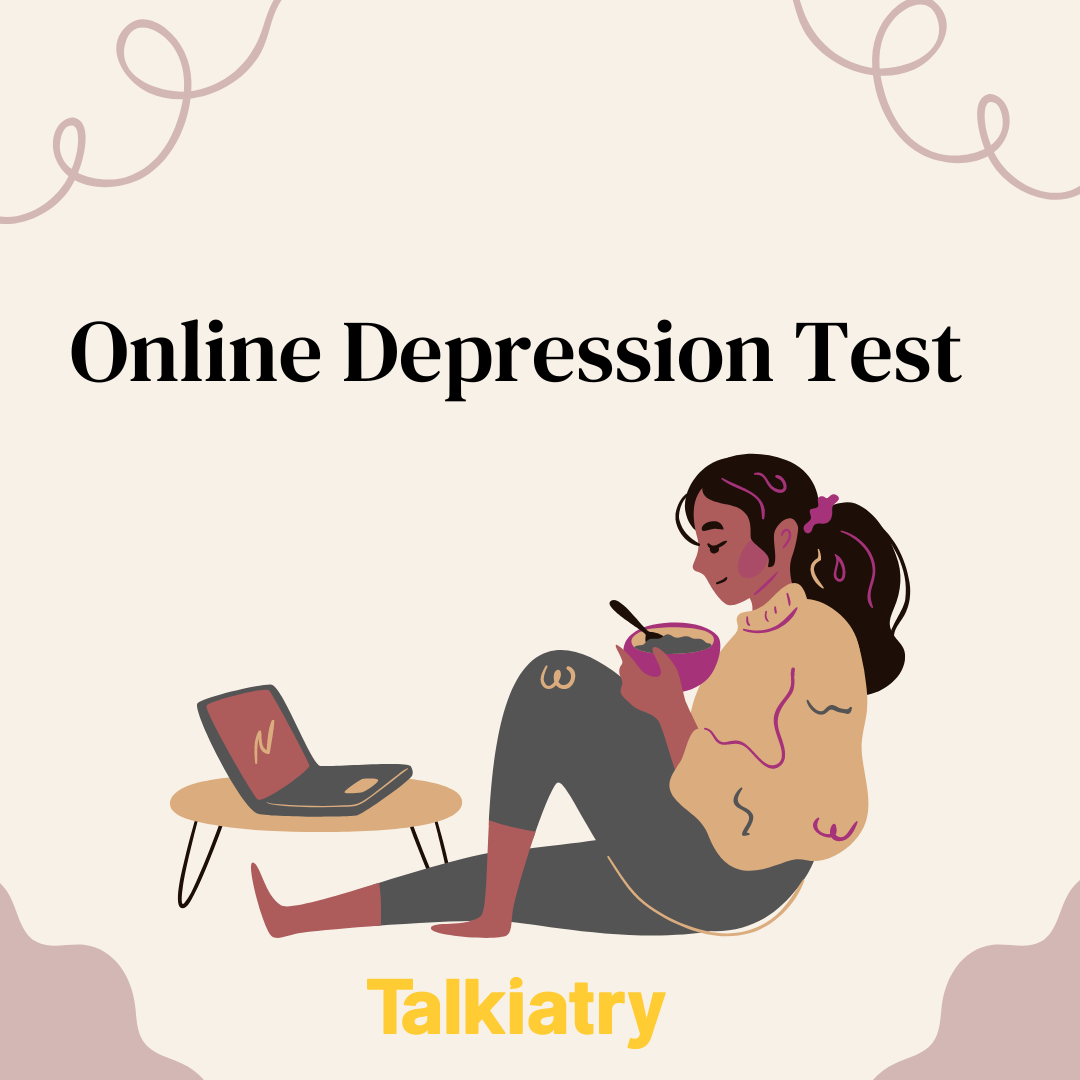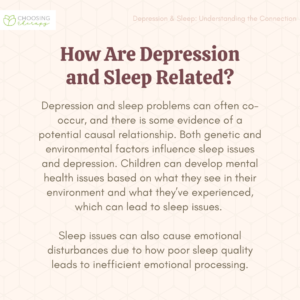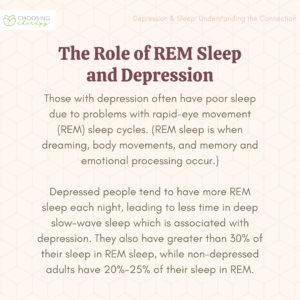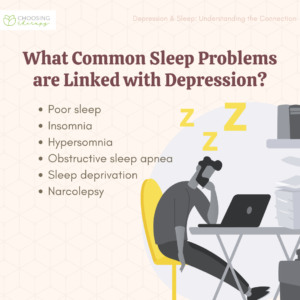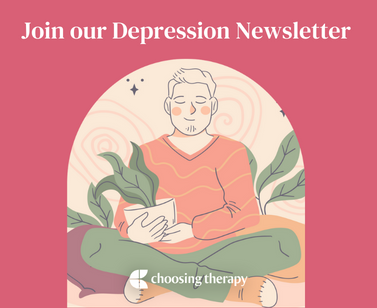Depression is a mood disorder marked by low mood, low motivation, feelings of withdrawal from activities you once enjoyed, eating changes, and sleep issues. Sleep and depression are heavily tied as the sleep process works to improve memory and cognitive function. Low-quality sleep over a long period of time can lead to acute depression, and depression symptoms can be exacerbated by poor-quality sleep.
Depression Is Treatable With Therapy
Would you like to feel more happiness and joy? BetterHelp has over 20,000 licensed therapists who provide convenient and affordable online therapy. BetterHelp starts at $65 per week. Take a Free Online Assessment and get matched with the right therapist for you.
How Are Depression & Sleep Related?
Depression and sleep problems can often co-occur, and there is some evidence of a potential causal relationship. Both genetic and environmental factors influence sleep issues and depression. Children can develop mental health issues based on what they see in their environment and what they’ve experienced, which can lead to sleep issues.
Sleep issues can also cause emotional disturbances due to how poor sleep quality leads to inefficient emotional processing. Many of these symptoms of both issues overlap and can create a cycle of low mood and poor sleep quality. One can cause the other and can create a vicious cycle.1
The Role of REM Sleep & Depression
Those with depression often have poor sleep due to problems with rapid-eye movement (REM) sleep cycles. REM sleep is when dreaming, body movements, and memory and emotional processing occur. Those with depression tend to have more REM sleep each night. Increased REM sleep during the night leads to less time in deep slow-wave sleep, which is associated with depression. Those with depression have greater than 30% of their sleep in REM sleep, while non-depressed adults have 20%-25% of their sleep in REM.2
Can Depression Cause Sleep Issues?
Sleep disruption, though not necessarily a distinct sleep disorder, is a key symptom of depression. Having a sleep disorder does not necessarily cause depression, but the resulting poor sleep can significantly increase the risk of developing depression. When one has long-term poor sleep quality, their abilities to dream, form memories, process emotions, and develop a healthy brain are significantly hindered.3
Can Sleep Issues Cause Depression?
Sleep issues can lead to depression as the processes occurring during normal sleep cycles are disrupted. Sleep improves memory and cognitive function. When sleep is disrupted or not on a routine schedule, it takes a toll on your body and mind. Low-quality sleep does not give your brain the time and space it needs to feel fully refreshed. Following a night of poor sleep, people often feel more irritable, tired during the day, and generally have flatter emotions.4
What Is Depression?
Depression is a serious mood disorder that can lead to suicidal thoughts and behaviors. While the exact cause is unknown, its development is based on a person’s environment, brain development and chemicals, and genetics. Depression can look different depending on the person, but there are some broad and common symptoms of depression to look out for. Depression can come on at different life stages, and the impact can change and vary across one’s life.
Common symptoms of depression include:
- Low mood most days
- Loss of interest in pleasurable activities
- Irritability
- Feelings of guilt, worthlessness, hopelessness
- Inability to complete tasks
- Withdrawn from family and friends
- Letting responsibilities go
- Isolation
- Self-harm
- Suicidal thoughts or behaviors
- Increased use of substances
Help For Depression
BetterHelp – Get help from a licensed therapist. BetterHelp offers convenient and affordable online therapy starting at $65 per week. Free Assessment
Talkspace – Online Therapy With Or Without Insurance. Talkspace accepts many insurance plans including Optum, Cigna, and Aetna. Typical co-pay is $30, but often less. Get started
What Common Sleep Problems Are Linked With Depression?
The impact of sleep on mental health is significant, with insomnia linked to a higher risk for depression. Sleep helps the brain regulate chemicals so they can work efficiently. Low sleep quality can impact memory, problem-solving abilities, serotonin and dopamine levels, and general awareness.
Depression symptoms can worsen with poor sleep and increase feelings of hopelessness and irritability. Nighttime depression, rumination, and low mood can worsen in the evening, contributing to ongoing sleep disruption. When this happens, some may defer to substances to cope and help them with sleep.
The most common sleep problems linked with depression include:
- Poor sleep: Low-quality sleep, oversleeping, and under-sleeping are all linked to low or inconsistent mood.
- Insomnia: Insomnia is the inability to stay asleep through the night and/or get to sleep at night. This impacts mood greatly as lack of sleep severely impairs our ability to regulate emotions.
- Hypersomnia: Sleeping too much and heavy daytime sleepiness are also linked with insomnia and depression. It can lead to poor quality nighttime sleep or an inability to sleep.
- Obstructive sleep apnea: This is a medical condition in which the body tends to stop breathing. Many wake themselves out of deep sleep but not enough to be fully awake. It impacts mood and overall tiredness during the day.
- Sleep deprivation: When a person doesn’t get enough sleep, it can lead to depression due to low processing speeds. It is also linked with heart issues such as hypertension, which increases the chances of heart attacks and strokes.
- Narcolepsy: Narcolepsy is a sleep disorder where one experiences significant daytime sleepiness and, at times, suddenly falls asleep regardless of where they are or what time it is. It is serious and can impact your day-to-day life and activities of daily living, social relationships, and work obligations.5
Treatments for Depression & Sleep Issues
There are several treatment options for how to treat depression and sleep problems as comorbid conditions. Treatment may look differently when the two are present together or alone, and may depend on the sleep issue.
Here are several options for treating depression and sleep issues:
- Cognitive Behavioral Therapy (CBT): CBT is an effective therapy for depression and sleep issues as it helps to reframe thoughts and behaviors. It can also depend on the individual, but individual or couples therapy can be helpful.
- Interpersonal Therapy (IPT): IPT helps those with depression work through interpersonal issues in a safe place to improve overall functioning with others.
- Medications: Selective serotonin reuptake inhibitors (SSRIs) and serotonin-norepinephrine reuptake inhibitors (SNRIs) are commonly prescribed medications for depression. Medication helps to improve the relationship between your brain receptors so neurotransmitters such as serotonin can move more easily in the brain.
- Brain stimulation: This can help when medication and therapy do not help enough to improve symptoms.
- Light therapy: Light therapy can help with seasonal depression. Light is key in improving the production of serotonin in the brain, and low light can lead to increased depression.
- Continuous positive airway pressure (CPAP): CPAP devices are used to treat obstructive sleep apnea, which impacts mood. When a CPAP machine is used, the continuous airway helps to ensure that proper sleep stages are reached for the correct amount of time. 6
11 Tips for Coping With Sleep Problems & Depression Symptoms
While everyone is different with their depression and how it impacts their sleep, these are some tips anyone can try. Some of these tips may or may not work for you, but try a few to see if they improve your environment and limit depressive episodes.
Here are 11 ways to improve sleep and depression-related issues:
- Maintaining a consistent wake/sleep cycle: Routine helps give our body structure, so having a routine can help your body learn when it is time to wake and sleep.
- Avoiding heavy foods or alcohol before bed: Eating and drinking at night can spike blood sugar and raise our body temperature and heart rate, which are all linked to sleep-related issues at nighttime.
- Practice meditation before bedtime: Meditation for depression is helpful as it helps to ground you in the present time and place. It helps to clear mental clutter and gives you a better chance of having good quality sleep.
- Yoga and physical exercise: The mental health benefits of exercise can positively impact your depression. Moving your body in a mindful and intentional way can improve your depression symptoms, specifically the impact on emotions and motivation.
- Evaluate for depression or another medical disorder: Getting an evaluation or consult from a therapist or physician can help rule out contributing medical issues.
- Stay away from screens: Screens emit a lot of blue light, which are known to keep you awake and interrupt your sleep at night.
- Make the bed a sacred space: If you are doing everything from your bed, your body and brain may associate your bed with activities that do not involve rest, which may make it harder for you to sleep.
- Lavender scents in the bedroom: Having a lavender spray, essential oils, or even fresh lavender at the bedside can help to promote relaxation which may be the support you need to get comfortable enough to sleep.
- Check medications: If you are taking any medications, make sure you check to see what the side effects are and speak with your physician if you feel this may be related to your medications.
- Try medications: It can be helpful to speak with your therapist or physician to try medications if you need further support.
- Natural sleep aids: While natural sleep aids are not without risks, some may find these remedies helpful for mild sleep problems. Always speak to your doctor about any sleep treatment you try to reduce the risks with other medications or medical conditions.
- Try the military sleep method: The military sleep method can help people fall asleep fast.
Final Thoughts
If you’ve tried home tips on improving sleep with little to no changes, it may be time to consider therapy for depression. People adapt to depression symptoms, so many may go unnoticed after some time. It can be hard to know how to begin therapy, but choosing an online therapist for your needs can be a good starting point. Cognitive-behavioral therapy is an effective evidence-based treatment for depression, and many skilled therapists are trained to provide this treatment. With many options for treatment and support, you can find a way forward with depression and sleep issues.
Additional Resources
To help our readers take the next step in their mental health journey, Choosing Therapy has partnered with leaders in mental health and wellness. Choosing Therapy is compensated for marketing by the companies included below.
Talk Therapy
Online-Therapy.com – Get support and guidance from a licensed therapist. Online-Therapy.com provides 45 minute weekly video sessions and unlimited text messaging with your therapist for only $64/week. Get Started
Online Psychiatry
Hims / Hers If you’re living with anxiety or depression, finding the right medication match may make all the difference. Connect with a licensed healthcare provider in just 12 – 48 hours. Explore FDA-approved treatment options and get free shipping, if prescribed. No insurance required. Get Started
Depression Newsletter
A free newsletter from Choosing Therapy for those impacted by depression. Get helpful tips and the latest information. Sign Up
Learn Anti-Stress & Relaxation Techniques
Mindfulness.com – Change your life by practicing mindfulness. In a few minutes a day, you can start developing mindfulness and meditation skills. Free Trial
Choosing Therapy Directory
You can search for therapists by specialty, experience, insurance, or price, and location. Find a therapist today.
Online Depression Test A few questions from Talkiatry can help you understand your symptoms and give you a recommendation for what to do next. Best Online Psychiatry Services Online psychiatry, sometimes called telepsychiatry, platforms offer medication management by phone, video, or secure messaging for a variety of mental health conditions. In some cases, online psychiatry may be more affordable than seeing an in-person provider. Mental health treatment has expanded to include many online psychiatry and therapy services. With so many choices, it can feel overwhelming to find the one that is right for you.